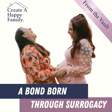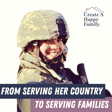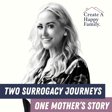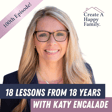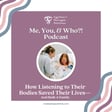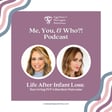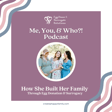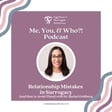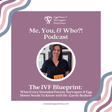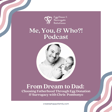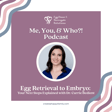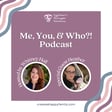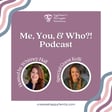Introduction to National Infertility Awareness Week
00:00:01
Speaker
Hi everyone, and welcome to our special National Infertility Awareness Week series. Today's episode is a powerful conversation about family resilience and advocacy.
Scott and Erin's Advocacy Journey
00:00:14
Speaker
Scott and Erin, who previously shared their journey to parenthood through egg donation, have returned. Their commitment to the infertility community didn't end when their family was complete.
00:00:25
Speaker
Scott and Erin have continued to use their voices to raise awareness, support others, and push for real change. In this conversation, we dive into the often isolating experience of infertility, the power of sharing personal stories, and the urgent need for better healthcare coverage and support systems.
00:00:46
Speaker
We also explore how advocacy, both personal and legislative, can make a lasting impact and why initiatives like National Infertility Awareness Week are so important.
00:00:58
Speaker
Whether you're personally impacted by infertility or simply want to be a source of support, we are all in fertility. And this conversation is full of insight, hope, and actionable ways to be a part of the change.
Exploring Alternative Family Building Methods
00:01:14
Speaker
Me, you, and who? Who knew it would take more than two people to have a baby in a world where infertility is no longer a taboo topic.
00:01:24
Speaker
This podcast will take you through all of the different aspects of surrogacy and egg donation through the lens of many who walk this journey in different ways. My name is Whitney Hall and I am a two time surrogate now turned surrogacy coordinator for egg donor and surrogate solutions.
00:01:42
Speaker
the very agency I used when I chose to carry for two amazing families. With this podcast, it is our goal to help guide and support you as you learn about what it takes to grow a family in an alternative way, as well as hear inspiring and beautiful stories of how this path has changed lives forever. We can't wait for you to hear about just one more way happy families are created every day.
The Power of Personal Stories in Advocacy
00:02:10
Speaker
Well, like I said, you guys, thank you so much for being here again. We are just so lucky that feel so lucky that I get to talk to you guys again. you know, you both have previously been on just to discuss, you know, what it was to you.
00:02:26
Speaker
your path to parenthood via egg donation and all of that. But now we're going to talk a little bit more, you know, you guys made your family and instead of being like, all right, good, we we've done it moving on to the next, you guys have decided to, you know, continue to just invest in this community through advocacy and everything. So just tell us more about that.
00:02:45
Speaker
Give us more like kind of what started you guys just wanting to kind of have, I guess that passion and, you know, make just greater awareness when it comes to, you know, just, the infertility world yeah I think for me like it's it can be very isolating because it tends to be not something that a lot of people talk about and then once I did start talking to a few people about it then they would tell me their stories as well and it was kind of interesting like the more that we got out there and like started talking to people the more we realized
00:03:19
Speaker
this impacts so many people in so many different ways. um you know My personal history comes from you know infertility, from cancer treatment that I had when I was younger. And so from that perspective, I've kind of always been you know able to, I think, sometimes be a little bit more open about it just because it was this kind of big medical thing that happened to me in the past. sure so it's always kind of been a part of my like language and story throughout the years. yeah but and As I got into more of the fertility side of it, um and just you know talking with coworkers, talking with girlfriends, i and I know you talking with some of your guy friends at the at the gym, all of a sudden it's wow, a lot of people go through this in so many different ways. And i think i think now hopefully it's it's changing a little bit where people are talking about it more.
00:04:07
Speaker
and And so that's where you know that kind of sparked the interest of, hey, like we we have a story to tell here. and If we tell our story, other people may feel more comfortable to tell their story and like just, just getting it out there more. So it it normalizes it more that this is something that affects so many people on so many different levels. And, and so it just honestly, just kind of started from, from that really. think it's important as well for us for, if there's something that we struggled through to try to make it so other people in the future struggle a little bit less.
00:04:43
Speaker
I love that. Yeah. Just that whole idea of paying it forward and making it, ah like you said, a little bit easier for the next person. Because you're right, Erin. I mean, i i feel like it is the it is such a common storyline of I felt so alone And yet this affects so, I mean, infertility affects so many people in so many ways, right? Like your story of cancer treatment to, you know, just unexplained infertility. I mean, across the board, it affects so many people. And yet, like you said, everyone feels so isolated.
00:05:21
Speaker
Yeah. And I mean, like, and again, just exactly that to share your story, that alone is just so impactful, but you guys have gone beyond that. Tell us a little bit more.
00:05:33
Speaker
Yes. Yes. So, um, we, um, were, i think a bit frustrated going through it at the time her that there wasn't a lot of help. Like there wasn't a lot of assistance.
00:05:45
Speaker
Um, you know, the, um, we We didn't really have help from from you know the jobs that we were working in at the time for any you know financial, medical coverage. like That wasn't in the policy at all.
00:05:58
Speaker
um And it just kind of started a bit kind of getting a little bit into the weeds on that. Like remember emails to like human resources and why is it this way? Yeah.
00:06:09
Speaker
you know you know, just to trying to understand and kind of unpack kind of the history of it all and and why it isn't covered the way that it should be, why it's not just do you know something standard that's packaged into medical
Forms and Impact of Advocacy
00:06:24
Speaker
plans. And as we kind of got into that a little bit, then the fertility doctor that we worked with, she was actually a part of an advocy and advocacy group here and um kind of pulled us in as just a patient um that could tell their experience to this group of stakeholders.
00:06:44
Speaker
and And so that was really kind of the start of it a little bit was was to you know just kind of you know share you know kind of our journey and how some of the coverage impacted us, impacted the decisions that we made, impacted what we were able to kind of do.
00:07:01
Speaker
and and then, and then you get a little bit more connected and a little bit more connected and it just kind of, it kind of grows. it And so I i think that's, what's really cool about advocacy is just, even if you get out there just a little bit, you're, you're going to make these little connections over time that, you know, as you choose, you can kind of grow it and,
00:07:20
Speaker
and jump into to you know different things. And so that's really allowed me and Scott, you know kind of through the years to, you know people know that we wanna share our story, they'll reach out to us when they're offering opportunities.
00:07:33
Speaker
um And that's that's just kind of how it's how it's grown bit bit by bit. Yeah, I think it's important to think about what advocacy looks like. And it's it's not just putting on a suit and going to Austin to talk in front of the legislature. It's talking to your group of friends like Erin's dead at the gym. and Hey, yeah we you I remember after you some of the difficulties she had through through childbirth, talking to some of the guys there and we realized you know how many, if we were back 50 years ago or in any other place in the world, how many of our spouses would have been lost? how many How many of our children might not have made it and And just you know having those conversations where you know you all of a sudden
00:08:16
Speaker
yeah wow that you know that That's advocacy. that's Yeah, that's community. There's a lot of different ways to be an advocate for this. Yeah. Some of the maybe more uncomfortable ways for certain people, like like getting up and public speaking and things like Sure,
00:08:33
Speaker
Well, love that, Scott, because you're right. There is such a range of...
00:08:39
Speaker
I, I, it's that spectrum, right? It, that it is, you know, yes, we need absolutely all of those people on Capitol Hill. And that is, I mean, that makes a difference that, and it's so important. And to your point, there is that need of Capitol Hill and it does make such a difference and it does make the next person have a bit of an easier go.
00:09:00
Speaker
And also exactly that Scott of we're at the gym and, just knowing that someone else has had that experience or I'm going through it, you know, with them together is again, breaks down that barrier of I'm not alone.
00:09:14
Speaker
I do have, you know, other people that are part of this and then we can have those conversations and then that can just, it creates this beautiful ripple effect.
00:09:25
Speaker
um Absolutely. Going back to just a little bit and just to break it down, when you were talking about um healthcare care plans, you're specifically talking, Erin, about insurance and, you know, just, and your HR policies and, you know, things like that.
00:09:41
Speaker
What were some of the, you know, barriers that you were for like firsthand experiencing and what, ah when, when you did, and then eventually when you did speak to that advocacy group, what exactly were you kind of trying to make people aware of specifically?
00:10:00
Speaker
Yeah. So in the, I mean, in the beginning, it was just trying to unpack, you know, quite honestly, what, what wasn't covered basically, which pretty much most, almost,
Navigating Financial Challenges in Infertility
00:10:11
Speaker
almost all of it.
00:10:12
Speaker
um And, and so then, you know, just trying to understand like, finances and how much is this piece going to cost and this piece going to cost and this is going to cost. I mean, it probably honestly took us like a couple of years to even just get ready to like do all of these different steps financially and just for, for, for all of that.
00:10:33
Speaker
um But along the way, I learned about some resources from from different nonprofit groups. There were some grants that we were able to apply for. And and we just kind of had the mentality that but any little bit helped.
00:10:48
Speaker
Absolutely. And because it is a really big financial undertaking and, you know, we had thought, oh, well, we probably won't qualify, you know, for a lot of this stuff.
00:10:59
Speaker
And actually when when we dove into it, we we did it. I think there were, I think, two different grants that we applied for and received, which we were very grateful for. um and and And so, you know, through, so then I think that's another piece of the advocacy is reaching out to let people know resources that are available.
00:11:19
Speaker
um And so so, for example, where I work now, we have a group of us that champion different resources for young adults going through their their cancer care.
00:11:31
Speaker
And it's supposed to be kind of like a one-stop shop where they come and they can have this comprehensive needs assessment. um And a part of that is fertility present preservation or you know down the line, you're ready to start your family. How do we you know get you connected to those people? And so that's been really great because then we can take um this this group and we we meet once a quarter.
00:11:54
Speaker
and And we talk a lot about fertility. How do you talk to your patient about fertility? And and so now, you know, my work in advocacy in that group has now kind of spilled down to this whole other group of providers.
00:12:09
Speaker
And they're now advocates in their department because they feel empowered to have these conversations and kind of train some people in their group with how to have the have those conversations. So I think the more we can just connect people to the resources that are available through advocacy as well, that that's huge.
00:12:27
Speaker
um Because it's ah it's already such a big process to understand just medically in and of itself. And then you add in all of these other layers to it. And it can just be a lot. when When we started going yeah going down the path for yeah to to build our family, I was working for a larger European company and i was disappointed to look through our coverages and and realize that there was nothing in there for you know family planning and family building.
00:12:58
Speaker
And so I started talking to our HR department about it. And I did a little bit of research on it found from the World Health Organization that one in six families in the world will suffer from some type of infertility problems and talk to them about I detailed out like our the ages of people working in the company and and what actually relatively small impact that would have financially on the company to provide benefits like that, but what a huge impact that could make not only to their employees, but as a employee recruitment and retention.
00:13:35
Speaker
yeah And unfortunately i didn't work out for us, but shortly after we got through the through the entire process, they did end up adopting fertility coverage as part of the benefits package. And, you know, so hopefully that will help some of my coworkers, you know, download it.
00:13:55
Speaker
It really only takes a conversation and and sometimes maybe a persuasive argument, but, um if you have the conversation, people are people are inclined to listen.
00:14:07
Speaker
Yeah, no, for sure. So ah speaking of that conversation, how do you approach, I mean, you obviously did this full extensive research and, you know, I'm envisioning a presentation and pie charts and, you know, just all of them.
00:14:21
Speaker
love it. But how you, you know, maybe for people who are needing take steps to, do you you know maybe for people who are needing to take those steps to you approach HR or their boss or, you know, just really just in general, I mean, how would you maybe, or how did you, I guess, approach conversations, you know, for people who don't necessarily fully understand what it means to be a part of the infertility community and how certain benefits really can make a huge difference?
00:14:55
Speaker
Well, I think there's nothing more powerful than your own story. And, you know, when... When it's an idea, people have trouble connecting with it. When it's your story, people can connect with it much easier. And so I, you that was, that was always my my path was, Hey, this is something we're going through. This is something that not only we are going through, but something I can guarantee you, flat out guarantee you that a number of people that you know are also
00:15:26
Speaker
yeah And i'm willing to I'm willing to talk about it because it's something that needs to be said, but there are a lot of people that that don't feel as comfortable doing that. But you know that.
00:15:37
Speaker
They're going through it too. And think not only you know in the workplace, but even I think in our families, we've seen um you know a change in ah changing in some of their thoughts and opinions as they've gotten to put a face in a, you know, face with a story and a face with a concept.
00:16:00
Speaker
Yeah. ah Yeah. What, when you say thoughts and opinions, what, what do you mean by that? Are you thinking like, is it misconceptions? Is it like, tell me a little bit more what you mean by that.
00:16:12
Speaker
oh the The thoughts and opinions of like our family and how they're changed? No, I mean, either the workplace, right? Like maybe it is kind of, you know, oh, this really is just so, you know, this only affects a small amount of people like, or, you know, maybe this is too expensive or, you know, kind of what were some of those things? I think for a lot of reasons, anything around fertility and and family planning, it has...
00:16:40
Speaker
It has a tendency to be a bit of live wire sometimes for people. Sure. And so I think that sometimes there's there's these ideas of extremes out there and to to be able to to talk about it in in our experience,
00:16:59
Speaker
It's not actually usually that world of extremes. it for Sure. It is not the people magazine. It is not the headline.
00:17:07
Speaker
You know, and and our case was, our case was, you know, something very much expected with, you know, your, your cancer diagnosis and treatment. yeah this was always a path that we were going to go down but a lot of people it's not it's a big surprise And, you know, ah again, for for us, the the pathway there was was a a very complex process sort of egg donation and and IVF, et cetera.
00:17:33
Speaker
But again, for a lot of people, their journey to fertility doesn't have to take such a drastic path. Sure. sure you know these these extremes of opinion i think don't don't really do anybody any any help.
00:17:48
Speaker
But yeah, to to be able for our family to recognize, you know, that this is a ah path that a lot of people end up having to take was helpful.
The Need for Legislative Advocacy and Employer Support
00:18:01
Speaker
You, Scott, specifically, you know, you kind of had those those moments at the gyms, but then you did make reference to going to Capitol Hill and, you know, speaking to lawmakers and policymakers. What, you know,
00:18:14
Speaker
What was that experience like? Why is that so important? You know, so I believe there are only 19 states in the U.S. that require some form of infertility insurance coverage.
00:18:31
Speaker
yeah It's very helpful to speak to your employer to to try to to try to make change on a one-on-one, one-on-one basis. Sure. it's even more effective when your employer is mandated to do it. And and so that advocacy, you know, that that is typically only going to come from one place and actually in the U.S., 50 places. and and and so getting out there, reaching out and and making sure that the the people who have the power to make those decisions also happen to understand
00:19:09
Speaker
what they're being asked to make a decision on ah again, kind of back to the the idea of these extremes, you know, nobody's asking them to make a decision on that. They're asking for the ability to make our decisions ourselves and, uh, to, to be able to be in a financial place to make that decision.
00:19:32
Speaker
Even if it's, even if something is legal if you don't have the financial means to do that you're not in a position to make that decision and so advocating for that coverage for that um that chance to make that decision is I think a really important thing to do Right. I mean, it feels so basic. And I mean, again, to your point, right, like there is those spectrums of people. There's a situation of, you know, where, Erin, you knew that this was going to, you know, be the path to, you know, parenthood.
00:20:04
Speaker
You have same sex couples where it is guaranteed you are going to have to have some sort of fertility treatment if you want to grow your family in this way. And then, yes, there is the people who, surprise, this was not part of your plan. And now all of a sudden, you know, this this is a path to build your family.
00:20:21
Speaker
And exactly to your point, Scott, I love the way you said it, just the ability to make that decision and not have things like, is you know this lab test covered or not covered? And you know the difference between $5,000 ultrasound versus you know a $20 copay is huge.
00:20:45
Speaker
Exactly, yeah. And there's just, there's so many different ways that it's It's impossible to like legislate all of these nitty-gritty little details. You know what i mean? And I think things just get stuck and stalled out in all of that. you know And it's it's like you know if the if the medical professionals and the patients could just have the power back to make decisions for what's right for them and their family and what they're trying to do, i think most of that at the end of the day is when you actually look at it, it's it's all very reasonable.
00:21:21
Speaker
um and And we just having these conversations hopefully brings people back to that conversation of reasonability. Sure. Yeah. No, absolutely.
00:21:32
Speaker
If in a dream world, in a dream world, what just at the most basic level, what do you wish all employers had in, you know, kind of their,
00:21:48
Speaker
I guess their healthcare care package, if you will. Like what what do you wish everybody just had the ability to have? Yes. So i think for women, um especially as we are trying to advance our careers.
00:22:05
Speaker
as Sometimes, you know, family planning lags behind that a little bit. And so being able to store and freeze, you know, eggs and embryos, I think ahead of time that should just be standard, especially if you're the employer who's, you know, asking somebody to do these things in their career. And so maybe they're delaying their own family building a little bit longer.
00:22:26
Speaker
yeah I think tying that um you know to together is is is huge for kind of women and and gives them the peace of mind. um And then you know full paid maternity and paternity leave would be amazing. Oh, that'd be amazing.
00:22:43
Speaker
Across the board. um and And then you know taking it a step further with with fertility. you know it's It's great to be able to store eggs and embryos, but but what if what if you can't? you know What if you did that and it didn't work? And then you need more help with IVF or egg donation or surrogacy.
00:23:04
Speaker
I mean, I think across the board, i think everybody should be allowed the same opportunity to try to build their family. And and I just, I wish that employers would support that in its entirety.
00:23:16
Speaker
It's also, i think i think it's an opportunity to to put it back to the employer. um You want to be an employer of choice. You want the best people in in your industry to want to come to work for you.
00:23:33
Speaker
And I think for them to recognize that one in six of their employees is likely to be impacted by this, sir you know, that's a that's a huge opportunity for them to reach out not only to current but but future potential employees.
00:23:53
Speaker
and and show that that they recognize that that they want to support the whole employee and and be a employer of choice.
00:24:04
Speaker
Yeah. No, it's I mean, yes, that's beautiful. Because, yeah, again, yes, employers, hear this. At the most basic level, exactly to what Scott said, you want to be good to your employees. And little, i i say little,
00:24:19
Speaker
Small line items that have such a big impact like this, that's one of the biggest ways you can do it. Absolutely. A hundred percent, a hundred percent. For anyone who is maybe, you know, we talk about these things, they seem so big s and you know, Oh, is my, is, is my one little story going to really make a difference or, Oh my gosh, there's no way I can imagine, you know,
00:24:49
Speaker
sitting in front of people on Capitol Hill and, you know, just all of those things. What would you maybe say to someone who they want to get involved? They want to advocate not just for themselves, but for, you know, just anyone else that's part of, you know, the infertility community. What do you think is maybe one of the most, the simplest way that they could get started?
00:25:10
Speaker
So I think like from a patient perspective, you know, you're kind of through your journey and now you want to try to to to help others and pay it forward. Sometimes even just reaching out to your medical provider and saying, hey, um you know, if anyone if you know you have new patients that are going you know through a tough time, you know, or you have somebody that wants to talk to somebody who's already been through it.
00:25:33
Speaker
um that can actually be really helpful. And a lot of times the medical providers can help to connect people together just on a one-to-one basis. And so that I think can be, it's like a really easy way, you know, even over the phone or over text message, just to kind of help somebody that's a little newer yeah walking those, those, those steps. um And then, you know, from, from there, if you want to do a little bit more, you can kind of start to branch out into your,
00:26:02
Speaker
community, again, your medical providers may know a little bit of some good advocy advocacy groups or social work in their medical office may be able to help a little bit with, oh, this is somebody that we've worked with with this situation or that situation.
00:26:17
Speaker
um There's a lot of stuff on online now too. you know You can kind of join different groups, different different chats. Sometimes just being in the mix a little bit and seeing how other people are sharing their advocacy roles.
00:26:32
Speaker
Sometimes like, oh wow, yeah, I can maybe do this or yeah do that. So I think just if you start slowly, then all of a sudden some of the puzzle pieces will kind of start to fall fall into place. from the legislative side obviously there's you know organizations like the alliance for fertility preservation, where you can reach out to and say, hey, I would like to get more involved. How can I do that?
00:26:53
Speaker
You can also reach out to um a sympathetic legislator. So if you've heard a particular legislator or politician in the past being supportive of this, reach out to them and say, hey, this is something that's important to me how can i help you push push this idea across the finish line how can we get it onto the desks of some of your colleagues and how can I be an asset to to help you do that as somebody who might have that firsthand, that first person voice?
00:27:22
Speaker
That's great. Yeah. Again, just sharing your story in, you know, that one more big way. No, that's super great. Thank you. Yes.
The Collective Movement of National Infertility Awareness Week
00:27:31
Speaker
So almost last question for things like, you know, national infertility awareness week,
00:27:42
Speaker
Why do you think a movement just like that one week affects, or it not affects, but why do you think it is so important for families who've been through infertility?
00:27:56
Speaker
Yeah. I think it just, it makes you feel a part of this collective whole, you know, as a group, like there's this whole week that's, that's dedicated to you know, to, to, to moving, moving the new needle forward on it.
00:28:12
Speaker
And, and just, um, I think all of the, just kind of love and positivity that's shared you know during that week is great. It's always just great to kind of organize it and just say, hey, just for this week, you know we're focusing on these amazing stories, this amazing advocacy, the changes that are coming down, you know just helping to spotlight you know kind of everything all at once in a comprehensive way, I think is so important.
00:28:41
Speaker
For sure. For sure. And I think it's so fun to, yes, there's a long way to go, but it's also great to kind of look back and see how far you've come to. Yes. exactly Yeah, for sure.
00:28:52
Speaker
For sure. Oh, I love
Personal Highlights and Closing
00:28:53
Speaker
that. Well, you guys, my final question and you guys have been here before, so you know what I'm going to ask, but as everyone knows, Whitney and coffee are just two peas in a pod. And so I always love to ask the question, what filled your cup today? Literally or figuratively, what has been the thing that has filled your cup?
00:29:15
Speaker
So we just finished up the the Houston Rodeo. Yes, we did. And our son is six years old. and did he do what I think he did? He did. He did mutton busting.
00:29:30
Speaker
Yes! We were like, hey, buddy, do you want to do anything? He's like, yeah i think think i okay And so so we got him down there and he got his little helmet and his little vest on there. Oh my gosh.
00:29:41
Speaker
And so for the listeners who are not aware of Houston Rodeo, first of all, it's the most amazing week ever, two weeks. And there's a mutton busting is literally literally exactly what it is. It's lambs, sheep, and kids riding on top of it.
00:29:58
Speaker
that That's... It's simply that. bily that could a five or six year old put him on the back of a sheep go
00:30:06
Speaker
i told him Nolan, I said, hey, just grab onto that sheep and don't let go until they pull you off. Hang on tight. He's like, okay, got it. And so he gets out there and they put him on a sheep called the Sheepinator.
00:30:17
Speaker
And and you know it's great because they asked him these questions before and then, what do you want to be when you grow up? He said, want to be in the Army Corps of Engineers and I want to be a football player.
00:30:29
Speaker
Excellent. so when he gets on he gets on the sheep and they open the gate and that she takes off running across there and you see him on the video he's just got it down here hold on and he ran clear across there and they had to pull him off. of I love it!
00:30:43
Speaker
So he ended up winning the whole thing and he got this uh the belt buckle champion belt buckle. Yes!
00:30:53
Speaker
So then we had to go buy him a belt. Right?
00:30:59
Speaker
And wore that thing around so proudly. It was fantastic. yeah Oh, I love that. Was he in the arena or was it like the, in the carnival park?
00:31:09
Speaker
The smaller side. Yeah. Oh, I love that. Oh, from one Houstonian another, that just warms my heart. that was That was pretty special.
00:31:23
Speaker
Yes. What about you, Aaron? What has filled your cup? Oh my gosh, recently, i think I'm very excited to go skiing actually and ah in just at the end of the week with my family. We haven't seen them in a little bit. So it's gonna be just everybody all in one big house for the whole week. And so I'm just, for for for me, that's what tends to fill my cup up. when When we see my family and Scott's family, we're just so lucky to have such great people in our in our lives. So I'm i'm very much looking forward just to seeing my family.
00:31:56
Speaker
family here pretty soon. Oh, I love that. I love that so much. Well, again, you guys, thank you so much for, you know, being repeat guests and, um, and talking more just about this and really just thank you for everything that you have done are doing and continue to do, um, for just spreading the word about, you know, what, um, what it means to be part of that infertility community. So thank you guys so, so, so much.
00:32:22
Speaker
Absolutely. Thank you for having us. Thank you so much for joining us on this episode of Me, You, and Who. We appreciate your time and hope you enjoyed our discussion today.
00:32:35
Speaker
As we wrap, we would like to remind you of some of the ways that you can stay connected with us and be part of the me, you and who podcast community. Firstly, if you haven't already, make sure to subscribe to our podcast on your favorite platform.
00:32:49
Speaker
Hit that subscribe button so you never miss an episode and can stay up to date with our latest content. But that's not all. We also have an exciting YouTube channel where we share some bonus content behind the scenes glimpses and video versions of our episodes.
00:33:04
Speaker
Head over to YouTube and hit that subscribe button there as well. And don't forget to click the notification bell so you'll be the first to know when the new episodes go live and for more exclusive updates, engaging discussions, and a chance to connect with fellow listeners.
00:33:19
Speaker
Be sure to follow us on our social media accounts. You can find us on Instagram, Facebook, and TikTok at Create a Happy Family. If you're interested in finding out more about creating a happy family, please visit us at www.createahappyfamily.com.
00:33:36
Speaker
Thank you again for being part of the Me, You and Who community. Your support means the world to us. I can't wait for you to join us next time as we continue to share stories and journeys of creating happy families.



